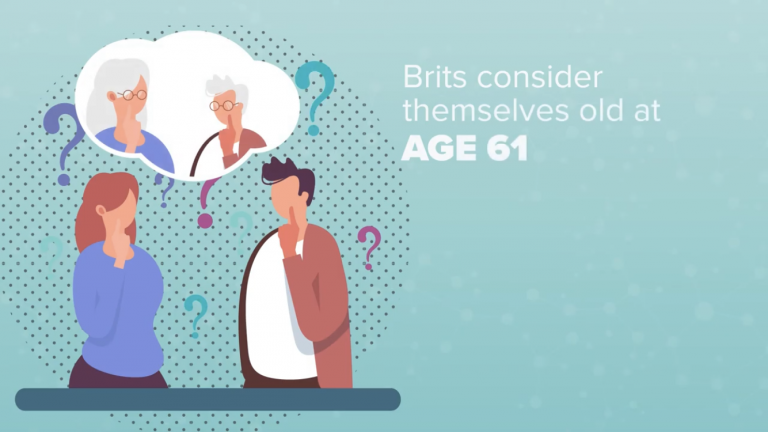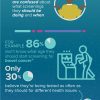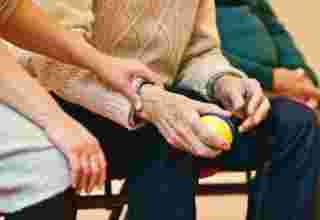
You’re officially ‘old’ at the age of 61, according to new research.
A survey of 2,000 Brits pinpointed the age at which people consider themselves to be ‘past it’, and revealed it to be just a year after the big six-oh.
Almost seven in 10 admitted to worrying about getting old, with half even claiming the idea of ageing makes them feel stressed.
But it’s more than just grey hair and wrinkles, with the study, commissioned by LetsGetChecked as part of Bowel Cancer Awareness Month, revealing their overall health is the top concern of those polled.
Not being able to take care of themselves (45 per cent), losing their independence (38 per cent) and having financial security (36 per cent) as they age are also among the most common worries.
Despite this, just 39 per cent are taking steps to prepare for their aging, with half admitting they aren’t actively saving money for retirement.
Of those who are, the average respondent is putting away 13 per cent of their monthly income.
For those putting off dealing with the issues around getting older and retiring, 26 per cent put it down to just not getting around to it.
But almost one in five admitted they don’t feel old enough or are dreading having to take care of things – particularly when it comes to their health.
And just 44 per cent feel knowledgeable about when they should start being screened for different health issues.
On average, respondents believed testing for breast cancer should begin at the age of 34 – 16 years younger than when screening is offered to women on the NHS.
The average adult also believed people start to be tested for bowel cancer, on average, at the age of 39 rather than the current recommended age of 55.
Dr. Robert Mordkin, chief medical officer for at-home health testing company LetsGetChecked [https://www.letsgetchecked.com/us/en/], said: “While the survey shows some people do know when they should be tested, there are still a large number of individuals who aren’t being tested as often as they should be.
“When it comes to a disease like colon cancer, proper screening and diagnosis are especially important, since most people won’t have symptoms in the early stages when it is most beneficial to catch the disease.
“We understand that not everyone has access to a doctor – particularly at the moment, when social distancing is so important – which is where home health testing comes into play; it makes screening easier and more accessible.”
The study also found 57 per cent of those polled aged 56 or over are either overdue for a screen or never had one at all.
jQuery(document).ready(function($) {
// We only want these styles applied when javascript is enabled
$(‘.gal_content’).css(‘display’, ‘block’);
// Initialize Advanced Galleriffic Gallery
var gallery = $(‘#thumbs_38883_2’).galleriffic({
delay: 3500,
numThumbs: 12,
preloadAhead: 12,
enableTopPager: false,
enableBottomPager: false,
imageContainerSel: ‘#slideshow_38883_2’,
controlsContainerSel: ‘#controls_38883_2’,
captionContainerSel: ‘#caption_38883_2’,
loadingContainerSel: ‘#loading_38883_2’,
renderSSControls: true,
renderNavControls: false,
playLinkText: ‘Play Slideshow’,
pauseLinkText: ‘Pause Slideshow’,
enableHistory: 0,
autoStart: 0,
enableKeyboardNavigation: true,
syncTransitions: false,
defaultTransitionDuration: 300,
onTransitionOut: function(slide, caption, isSync, callback) {
slide.fadeTo(this.getDefaultTransitionDuration(isSync), 0.0, callback);
caption.fadeTo(this.getDefaultTransitionDuration(isSync), 0.0);
},
onTransitionIn: function(slide, caption, isSync) {
var duration = this.getDefaultTransitionDuration(isSync);
slide.fadeTo(duration, 1.0);
// Position the caption at the bottom of the image and set its opacity
var slideImage = slide.find(‘img’);
caption.fadeTo(duration, 1.0);
},
onPageTransitionOut: function(callback) {
//this.hide();
setTimeout(callback, 100); // wait a bit
},
onPageTransitionIn: function() {
var prevPageLink = this.find(‘a.prev’).css({‘opacity’: ‘0.3’ , ‘display’ : ‘inline-block’, ‘cursor’ : ‘default’});
var nextPageLink = this.find(‘a.next’).css({‘opacity’: ‘0.3’ , ‘display’ : ‘inline-block’, ‘cursor’ : ‘default’});
// Show appropriate next / prev page links
if (this.displayedPage > 0)
prevPageLink.css({‘opacity’ : ‘1’ , ‘display’ : ‘inline-block’, ‘cursor’ : ‘pointer’});
var lastPage = this.getNumPages() – 1;
if (this.displayedPage < lastPage)
nextPageLink.css({'opacity' : '1' , 'display' : 'inline-block', 'cursor' : 'pointer'});
this.fadeTo('fast', 1.0);
}
});
/**************** Event handlers for custom next / prev page links **********************/
gallery.find('a.prev').click(function(e) {
gallery.previousPage();
e.preventDefault();
});
gallery.find('a.next').click(function(e) {
gallery.nextPage();
e.preventDefault();
});
});
But, even though respondents, polled via OnePoll, were aware of when they should be tested, 44 per cent still admitted to confusion surrounding the tests and screenings they should be receiving.
More than a third reported feeling too busy to think about preventative health tests and 37 per cent feel they aren’t being tested as often as they should be.
And 40 per cent would feel more comfortable about being screened for bowel cancer if there was an at-home test option.
Dr. Mordkin added: “If there is one thing we have learned from the coronavirus pandemic, it is the importance of trying to deliver elements of health care in new ways that allow people to conveniently and securely obtain evaluations and results without having to physically access traditional pathways.
“Hospitals, clinics and physician’s offices are best utilized to help those that are truly ill and need hands-on attention, but for screening purposes it is often better to have these performed offsite.
“This limits a healthy person’s exposure to potential infections while freeing up the resources of care facilities to be used where they are most needed.”
BRITS’ TOP CONCERNS AS THEY AGE
1. Overall health
2. Not being able to take care of themselves
3. Losing their independence
4. Financial security
5. Being seen as “old”
6. Weight gain
7. Feeling like a burden to their family
8. Wrinkles
9. Hair loss
10. Grey hair
WHAT’S HOLDING BRITS BACK FROM BEING TESTED FOR BOWEL CANCER?
1. Don’t have any symptoms of bowel cancer
2. I’ve never thought about it
3. Feel embarrassed/uncomfortable being tested
4. Worried what the results might show
5. I don’t believe I’m at risk for bowel cancer
ENDS



















